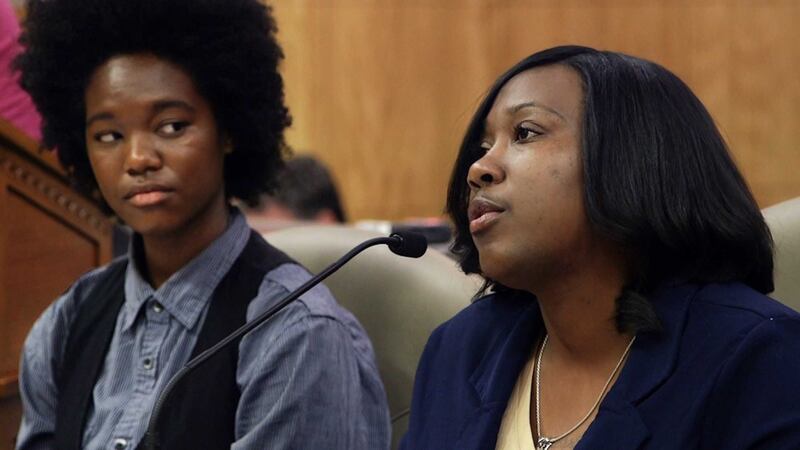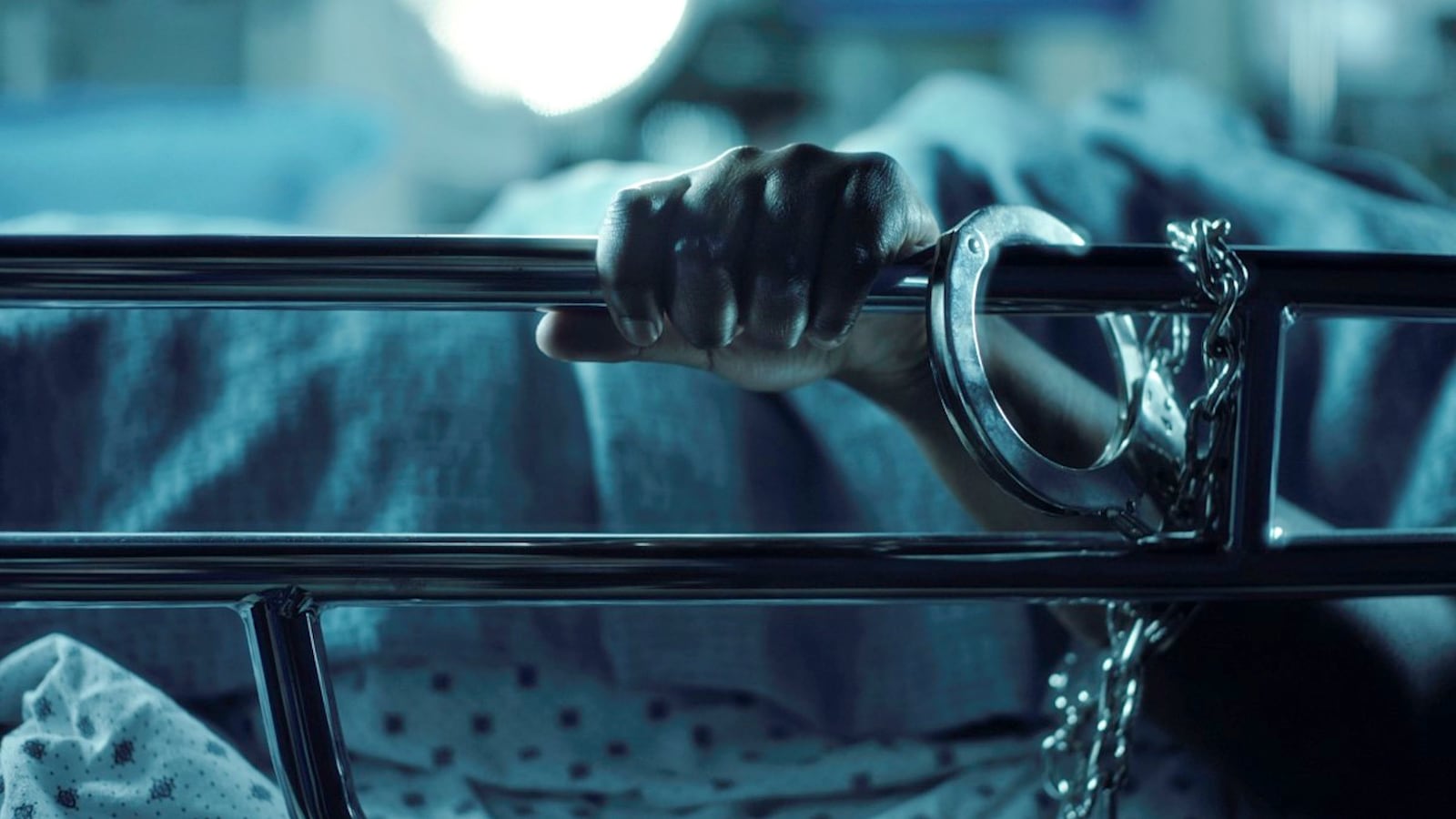Eugenics is still happening in the U.S. under the guidance of state medical authorities—and has been for decades. On Monday, a watershed whistleblower complaint from Dawn Wooten, a nurse working in ICE’s Irwin County Detention Center in Ocilla, Georgia, was filed by legal advocacy groups, Vice News reported. The complaint details forced sterilization of migrant women via mass hysterectomies. Wooten alleges that several detained migrant women would come to her asking why they had received hysterectomies, with one woman inquiring if the gynecologist they were seeing was a “uterus collector.” In plain terms, Wooten’s claim is that a population of deeply vulnerable racialized women, many of whom have already been separated from their children, are being sterilized by employees of the U.S. government.
“In one case,” Wooten said, “a woman who ended up with a hysterectomy was not properly anesthetized and overheard the doctor say that he’d taken out the wrong ovary. That woman had to go back and get her other ovary removed as well,” reported Vice News. If true, this means that yet again, the U.S. is practicing the science of eugenics—“the idea that it is possible to improve humans by allowing only some people to produce children,” as defined by the Cambridge English Dictionary—on its most vulnerable populations.
In the wake of Wooten’s complaint, many journalists have commented that there has been a long history of forced sterilizations in the U.S., particularly with Native American and Black women in the early Jim Crow era. But what many commentators don’t realize is that Wooten’s whistleblower complaint is not the only modern example of forced sterilization in detention.
Erika Cohn’s hugely important film Belly of the Beast, which comes out on PBS’s Independent Lens on Nov. 23, follows the decades-long struggle of Kelli Dillon, a Black woman who underwent a sterilization without her knowledge and consent while incarcerated in the Central California Women’s Facility, to pass a bill banning these sterilizations and providing reparations to survivors along with protections for whistleblowers. This week, I spoke to Dillon—who is now an activist and program manager advocating for survivors of sexual and domestic violence—Cohn, and lawyer and activist Cynthia Chandler to discuss Wooten’s whistleblower complaint and its connection to what they’ve been fighting against since 2000. “Immediately, I thought, this is another way that population control and racial discrimination is happening in these types of settings,” Dillon told me. “This type of thing can keep going on and on because it’s hidden under medical practices.”
“From the point of view of these institutions, why change anything when it has been working? Why change what you are doing, if you’re still getting the results that you’re looking for?” she adds. “But my question is, if the whole purpose of ICE detention is to detain and then deport, then what is the purpose of performing unnecessary surgeries on these women?”

Kelli Dillon in Belly of the Beast
Courtesy Idle Wild FilmsDillon’s own story is carefully and painfully traced in Belly of the Beast. At the age of 24, while incarcerated, Dillon was told that she had cysts and would need to have them removed. Months later, Dillon began having menopausal symptoms and lost an extreme amount of weight; she eventually found out that the surgeon had not merely removed cysts, but given her a full hysterectomy. She was never informed by doctors that she received the procedure. Dillon had two toddler sons at the time of her incarceration, and only received five visits during her 15 years in jail; learning that she would not be able to have more children was an incredible blow—she had already been separated, and estranged (for the time being), from her sons, and now would not get a second chance at raising children.
“It took a moment for me to actually open up and tell my story because it is the most painful part of my life,” Dillon explained. “When I think about it, I am choked up. It still comes up in the middle of my throat like a ball to the point where I almost cannot find my voice, even though my voice may seem strong and I seem boisterous and courageous—but that is not what I’m feeling on the inside.”
It was a mixture of her support from Justice Now and Chandler, who took on her case from the very beginning, that gave Dillon the initial courage to move forward and hold the California State Prison System to account. “But if it was not for the film, if it was not for Erika’s compassion, her heart, her love, and her vision in wanting to make society aware of this situation,” Dillon said, “I don’t think I would have gotten the platform. And I don’t think I would’ve found strength to actually speak.”
“Being behind the camera allowed me to have the voice first—to say what I needed to say without worrying about what the audience feedback was going to be. And then once I was able to see myself on camera in my own strength, then it made me a little bit more open and ready to tell the world. So I just thank God that Erika provided me the space, the safe space in order to talk about the most sensitive and painful thing in my life.”
That such horrors have occurred in this century in the state of California are only a surprise to those who do not yet know their history. As the film points out, Nazi Germany imported its own genocidal plan from the state of the California’s eugenics program and the U.S. government’s extermination and detention of Native Americans. Cohn told me, “I thought it was very important in the film to give that historical context... I really feel these situations are just another indication of what’s going on today. What was just published in Wooten’s complaint about the mass hysterectomies is another instance of modern-day injustice. America must confront its eugenic history and really prevent a new genocide from occurring.”
Chandler, a prison industrial complex (PIC) abolitionist, has dedicated her work as a lawyer to not just advocating for incarcerated people, but working to dismantle the prison system altogether. “I think there's sort of two kinds of civil lawyers,” Chandler told me. “There are lawyers who tinker around with the law and sort of geek out on it. And then there’s people who want to affect something and make something happen and they’re changing the law. The reason Erika was able to follow us for so long is that Kelli is a natural storyteller. And my whole way of approaching law has always been to be a storyteller.”
But a big part of the story Dillon, Chandler, and Cohn have been telling is one that most of the public has not been open to hearing. “What I first thought of when I heard the story about ICE detention was, well, of course that’s happening because that’s part of what white nationalism does,” Chandler explained. “I’m a huge fan of Ruth Wilson Gilmore, who’s a spectacular public intellectual and abolitionist and woman of color. And years ago I had a conversation with her and I said, You know, with doing this sterilization abuse work, I feel like I’ve been trying to figure out what California’s doing. California’s always been so avant-garde when it comes to prison policy and practices, and yet they seem almost so retro in how backward they were when everywhere else in the country, let’s say 10, 15 years ago, was starting to look at prison reform and sentencing reform. Yet California was like digging its heels in further to mandatory minimums and not going anywhere.”
“I said, I feel like I’m starting to realize what I’m seeing might be the rise of neo-fascism, and Ruthie was like, I think you’re right. I can see why you would think that and what you’re doing, how you’re looking at how eugenics is part and parcel to the work that prisons are doing. You’re documenting white nationalism and the rise of white nationalism, but I don’t think you’re going to get anybody to understand that or believe it now. And this was like 10 to 15 years ago that we were having this conversation.”
Dillon herself understood the connection between neo-facsism and the prison system, but she was still in shock when she learned of her hysterectomy. “Most African Americans have heard some of the history,” she told me. “I remember hearing about forced sterilizations through watching Schindler’s List and learning about the Holocaust. So I had a little bit of knowledge of it and also about how doctors were sterilizing slaves and performing certain medical experiments on slaves.”
“With my own experience of forced sterilization, I immediately could not believe that this was happening in 2000. I thought, this could not be happening in this day and age. And so trying to get other people to really, truly understand the gravity right here, trying to get people to really, truly understand the concept of sterilization… a lot of people, as Cynthia said, do not have the knowledge of what that really, truly means. So I think that when you don’t have the knowledge of what it truly means, the impact of activism is very limited.”
It took until 2014 for the anti-sterilization and reparations bill Dillon and Chandler had been fighting for, for over a decade, to finally be passed in California, yet the work is clearly not over. For Chandler, it used to be difficult to even get other PIC abolitionists as well as members of the prison reform movement (Chandler does not identify as a reformist) to believe forced sterilization was a serious issue. “There were times where I had to reduce the entire argument to say, look, it makes women rape-able. And that was the only way that men in the room who were part of the movement could appreciate and take the issue seriously—out of a space of chivalry.” Lately however, Dillon, Chandler, and Cohn have found renewed hope that the new racial justice movement that’s underway can transform how we talk about the intersection of state violence and gender oppression.
“To me, this sterilization abuse is one of the most fundamental markers of the work that modern imprisonment is doing, which is bolstering the white nationalist movement in our country,” Chandler told me. “And I do hope that the abolitionist movement sees it as such. I think there are more and more people seeing that. And I hope that people are really starting to look at and challenge fascism and see the significance of this sterilization abuse in that history of fascism replicating itself.”
Dillon emphasized that those who support universal human rights cannot ignore incarcerated and detained populations. “In America—and I’m sure it can happen in other countries but I can only speak to America—they find ways to criminalize and villainize certain races of people and marginalized people to give themselves an excuse to incarcerate them, to lock them up, to detain them or to put them away. But once they have detained them and incarcerated them or whatever they’ve done, then they act out these dirty little practices in order to remove the unwanted, the outcast, the most vulnerable populations, to get them out the way.
“So it’s not so much that these things happen mostly in prison, but that it almost seems that prison and detention centers and even mental health facilities were actually created to make sure that these things happen, whether they’re slavery or forced labor or medical practices and experimentations like mass hysterectomies and forced sterilizations.”



